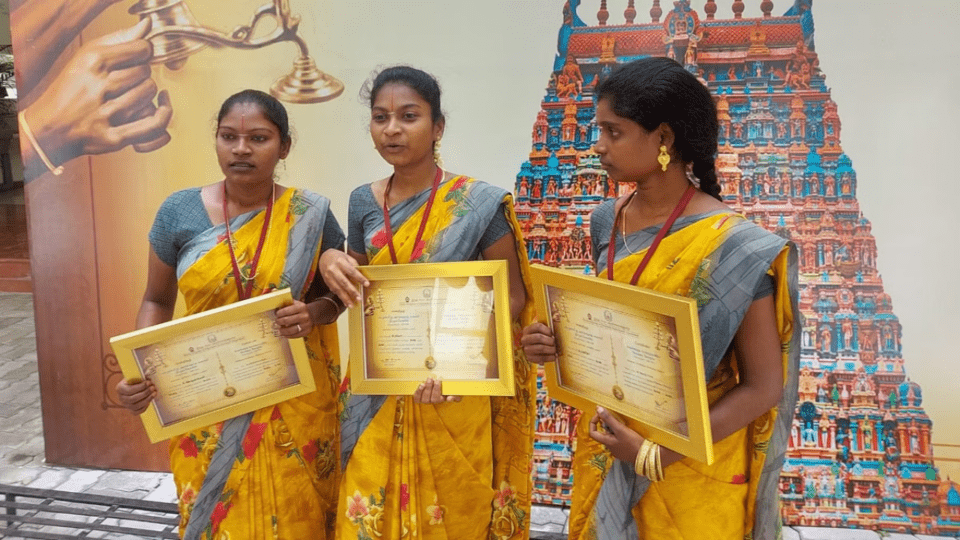In a momentous stride toward gender equality and religious inclusivity, Tamil Nadu has witnessed a remarkable shift as three young women successfully completed their training to become priests. Krishnaveni, S. Ramya, and N. Ranjitha are on the verge of shattering the long-standing male-only tradition as they prepare to take up roles as assistant priests in temples managed by the Hindu Religious and Charitable Endowments department. This marks a profound departure from established norms and traditions.
Recently, Tamil Nadu Minister Sekar Babu bestowed certificates upon these three women, along with their male counterparts, during a ceremony held at the Archakar Training School, administered by the Sri Ranganathar Temple in Srirangam. This historic moment is the culmination of a forward-thinking initiative introduced by the Dravida Munetra Kazhagam (DMK) government, which assumed power in 2021. Under this initiative, individuals from all castes were extended the opportunity to undergo priest training, with a particular emphasis on encouraging women to embrace this vocation.
Ramya, an MSc graduate from Cuddalore, reflected on this transformative journey, stating, “When the CM announced that even women can become priests, we saw it as an opportunity, as now women are present in all sectors.” While the path to priesthood posed its challenges, the unwavering determination of these women prevailed. Ramya expressed her heartfelt gratitude to their teacher, Sundar Bhattar, and extended warm thanks to the government and all their mentors for their steadfast support.
Krishnaveni, another remarkable member of this pioneering trio, shared her aspiration to serve both God and the people as a permanent priest in temples once they complete their practical training period. She affirmed, “I want to serve God and also serve the people. That’s the reason why I chose to do this,” underscoring the profound sense of purpose driving this historic achievement.
Tamil Nadu’s Chief Minister, MK Stalin, hailed this development as a “Dravidian model of governance” ushering in a “new era of inclusivity and equality.” He emphasized that despite women’s remarkable achievements as pilots and astronauts, they were unjustly barred from the sacred role of temple priests, even in temples dedicated to female deities. Chief Minister Stalin affirmed, “But change is finally here!” He went on to laud the Dravidian Model Government for removing the barriers that have long existed, allowing people of all castes and now women to enter the sanctums, thus ushering in an era of inclusivity and equality.
Throughout their training, Krishnaveni, Ramya, and Ranjitha acquired comprehensive knowledge of the various rituals, poojas, and mantras essential for the role of a priest. The DMK government has championed this initiative as a means of “upholding social justice” and “ensuring inclusivity” by opening the doors for individuals from all castes to serve as priests in Tamil Nadu temples upon completing the required training.
Describing this historic development as a “revolutionary step forward,” Manickam Tagore, the Congress MP from Virudhunagar, called upon the central government to introduce a similar scheme for the entire country during the upcoming special session of Parliament commemorating “75 years of independence and Amrit Kaal.” This call for extending the initiative nationwide underscores the significance of the change that Tamil Nadu has initiated, setting a precedent for inclusivity and gender equality in religious practices.
As an independent media platform, we do not take advertisements from governments and corporate houses. It is you, our readers, who have supported us on our journey to do honest and unbiased journalism. Please contribute, so that we can continue to do the same in future.

